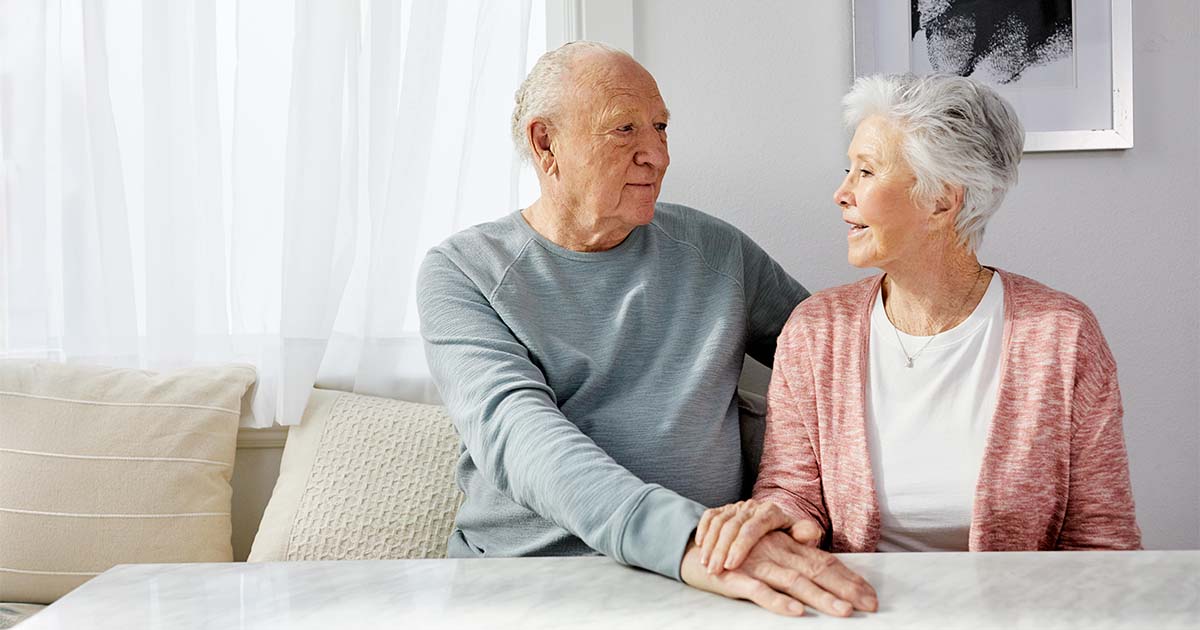When you or a loved one choose hospice care, it can feel overwhelming to know that people you’ve never met will be coming to your home to provide care. But knowing who is on the hospice care team – and what each person’s role is – can help you feel more comfortable during the end-of-life journey.
What is hospice?
Whenever someone is facing a terminal illness and decides they no longer want treatment, they may desire hospice care to help them navigate their end-of-life journey.
Hospice is not a place but rather a philosophy of care. It focuses on providing compassionate care so people can live as fully and comfortably as possible in the last stages of their disease.
There are many different services offered in hospice care including physical, psychological, spiritual and emotional support. Medicare-covered hospice services include:
- Interdisciplinary care team:
- Medical, nursing services
- Social support services for patients and loved ones
- Spiritual care for patients and loved ones
- Aide and homemaker services
- Medications & supplies related to terminal illness
- Durable medical equipment (DME)
- Pain relief and symptom management
What is an interdisciplinary approach on a hospice care team?
Medicare covers an “interdisciplinary care team” for hospice services. This means that the people providing end-of-life care come from different fields and educational backgrounds.
Hospice care teams are made up of compassionate, skilled individuals spanning disciplines like nursing, spiritual care or even volunteering. This ensures that patients receive the care they need, no matter whether it is physical, emotional or spiritual.
Who makes up the hospice care team?
When starting hospice care, you may meet a lot of new faces. From nurses to social workers to volunteers, there are many individuals on the hospice care team.
The Medicare-required core interdisciplinary team is the attending physician, registered nurse, social worker and chaplain. These four core disciplines meet at least every two weeks to review and revise the patient’s plan of care.
At Enhabit Home Health & Hospice, our hospice care team is made up of the following skilled individuals.
Medical directors
Medical directors are physicians who certify that patients have a prognosis of six or less months left to live. Additionally, they will consult with other physicians involved in the patient’s care plan, if applicable, and educate or guide care measures with the rest of the hospice care team.
Attending physicians
Attending physicians perform the same duties as the medical director, certifying that the patient has a terminal illness and less than six months left to live. They will also continually assess patient needs, manage symptoms and prescribe treatment and medication all the while coordinating with the rest of the hospice care team.
The attending physician can be an outside physician that the patient or caregiver prefers to coordinate and manage their care. Patients can also elect to use Enhabit’s medical director as their attending physician for hospice care.
Nursing staff
The nursing staff is made up of registered nurses (RNs), licensed practical nurses (LPNs) and licensed vocational nurses (LVNs). They work together to determine patient needs and ensure the customized care plan is being followed.
Nurses will also provide skilled nursing services. These include disease process education, medication management, safety precautions, wound care and skilled treatments such as catheter or ostomy care.
Lastly, they will coordinate care with the rest of the hospice care team, making sure all individuals know what will best suit the patient’s needs.
Social workers
Social workers don’t provide physical care. Instead, they assess the emotional, social and financial needs of patients and their loved ones. Whenever they identify a lack of resources, they can connect the patient or their loved ones to the appropriate community agencies to get further support.
As a trained mental health professional, they can also provide direct counseling and bereavement support to patients and their loved ones.
Chaplains
Hospice chaplains are experienced professionals who plan, assess and care for a patient’s spiritual needs during their end-of-life journey. They provide counseling to both patients and their loved ones, consultation to the clergy community and assistance with memorial preparations.
Bereavement specialists
Bereavement specialists help with memorial services and support via frequent verbal and written communication with family and friends. They provide healing resources and grief counseling for loved ones up to 13 months after a patient’s death.
Hospice aides
Hospice aides provide personal care and comfort measures including helping with hygienic routines and keeping wound dressings clean and dry. They will also report identified needs to the registered nurse or case manager and provide emotional support to patients and their loved ones.
Volunteers
Hospice volunteers provide companionship and emotional support to patients and their loved ones through non-medical services. This can look like sitting with a patient, running errands, walking family pets, assisting with light house cleaning or writing a journal with patients. Volunteers can also provide respite time for caregivers and family.
Therapists
The therapy team is made up of physical, occupational and speech therapists. Therapy needs aren’t as common in hospice as they are in home health, but therapists are available to assess any therapy needs and provide home safety solutions.
The hospice care team comes together
The end-of-life journey can be difficult to navigate, but a hospice care team is there to help make the last moments of life special.
Learn more about how Enhabit’s team came together to help a hospice patient check off the items on his bucket list
“At Enhabit, we want patients and their loved ones to know we are there for them, no matter what,” Executive Vice President of Hospice Jeanne Kalvaitis said. “We know patients want to spend their last days at home, comfortable and surrounded by the people and things that matter the most. We give them the opportunity to do just that, receiving compassion and dignity through their last moments.”
Social Share
At Enhabit our patients are our number one priority. From providing the latest medical practices to building deep personal connections, we’re focused on upholding every patient’s dignity, humanity and sense of control on their health care journey.
Home health
Our home health services give patients access to the care they deserve in the comfort of their own homes. From disease and injury management to recovery from surgery, our clinicians help patients confidently achieve their healthcare goals.
Hospice care
Our hospice care services place importance on the comfort of every patient living with a terminal illness. Our caring professionals are dedicated to providing not just physical care, but spiritual and emotional support to every patient and their loved ones.






